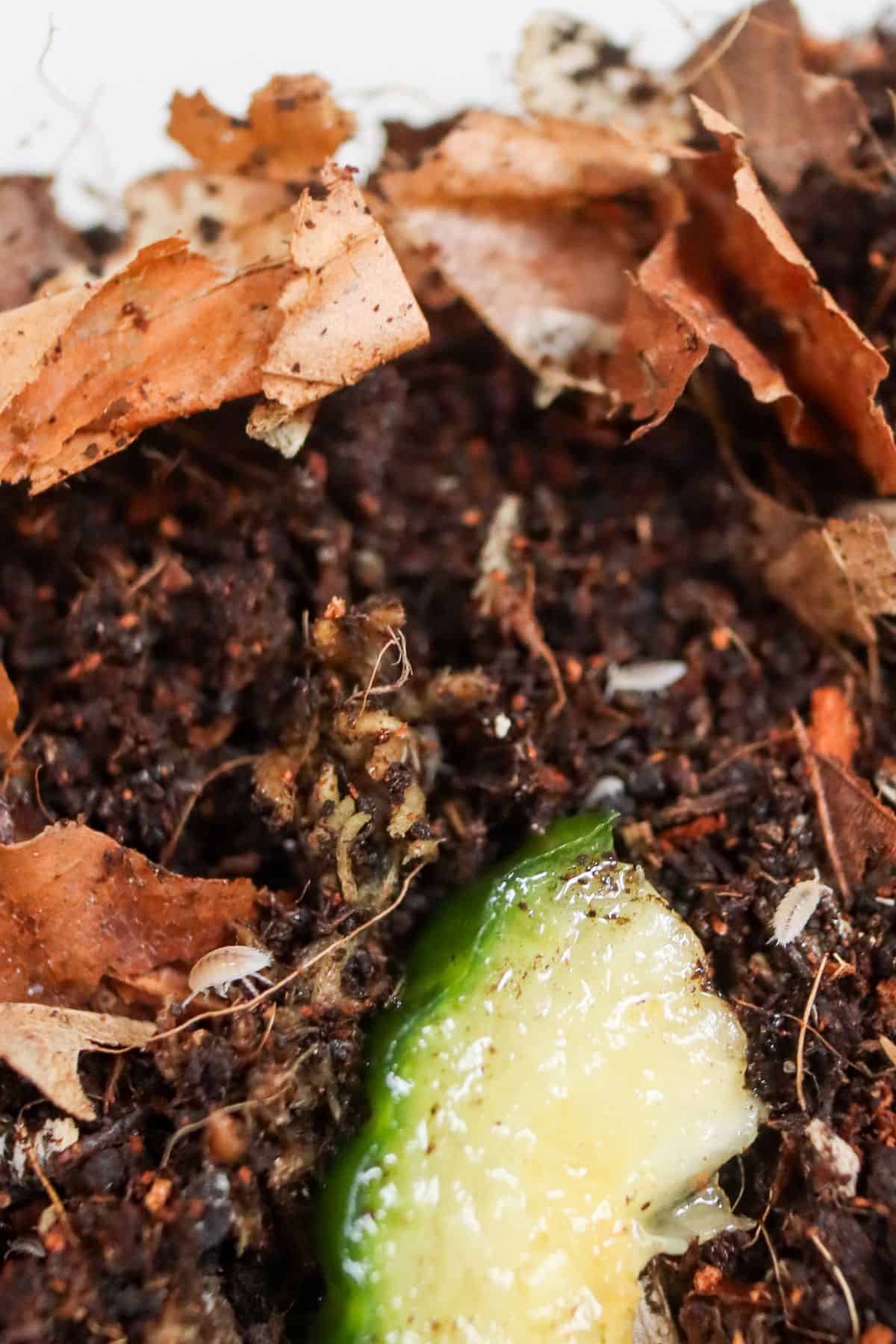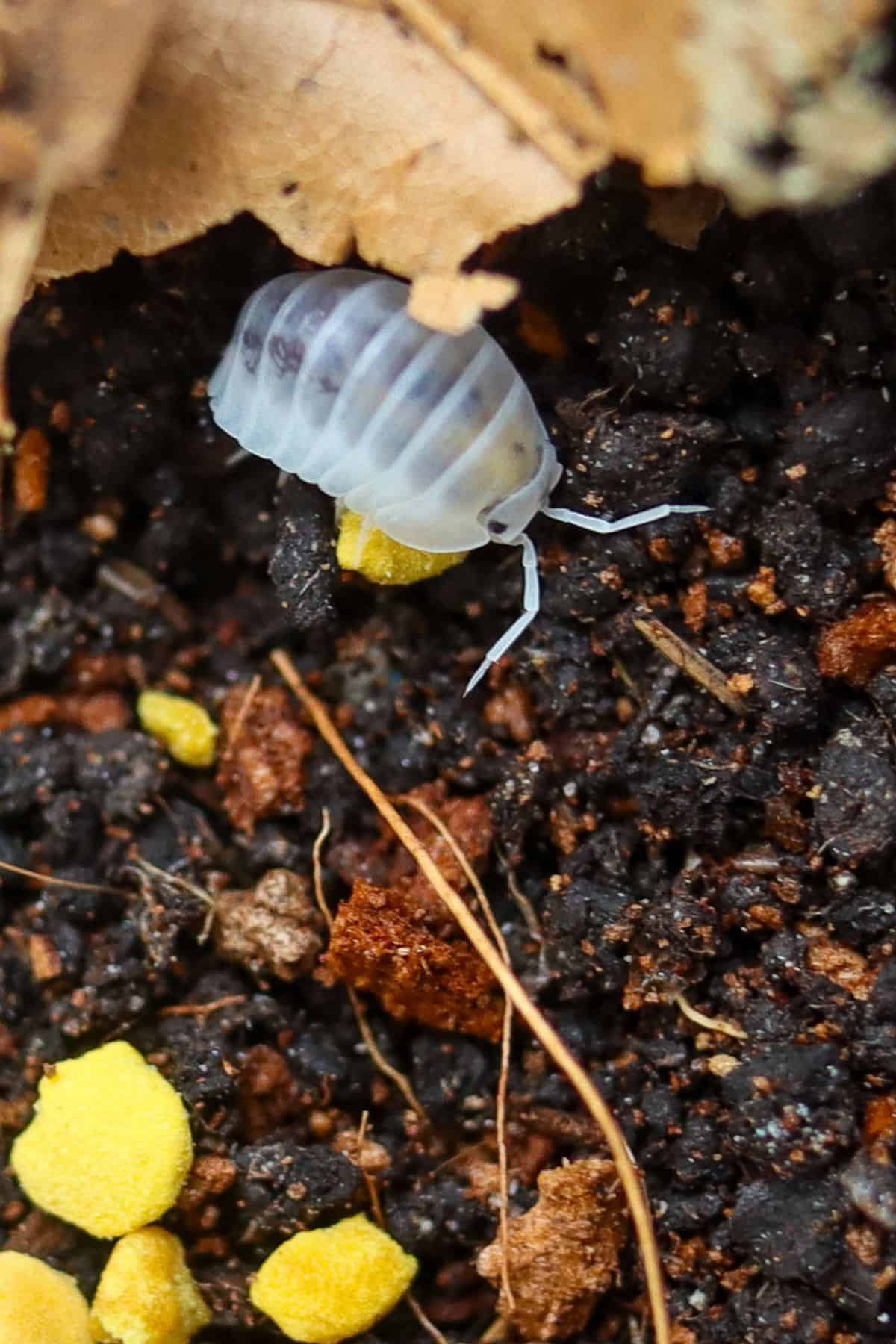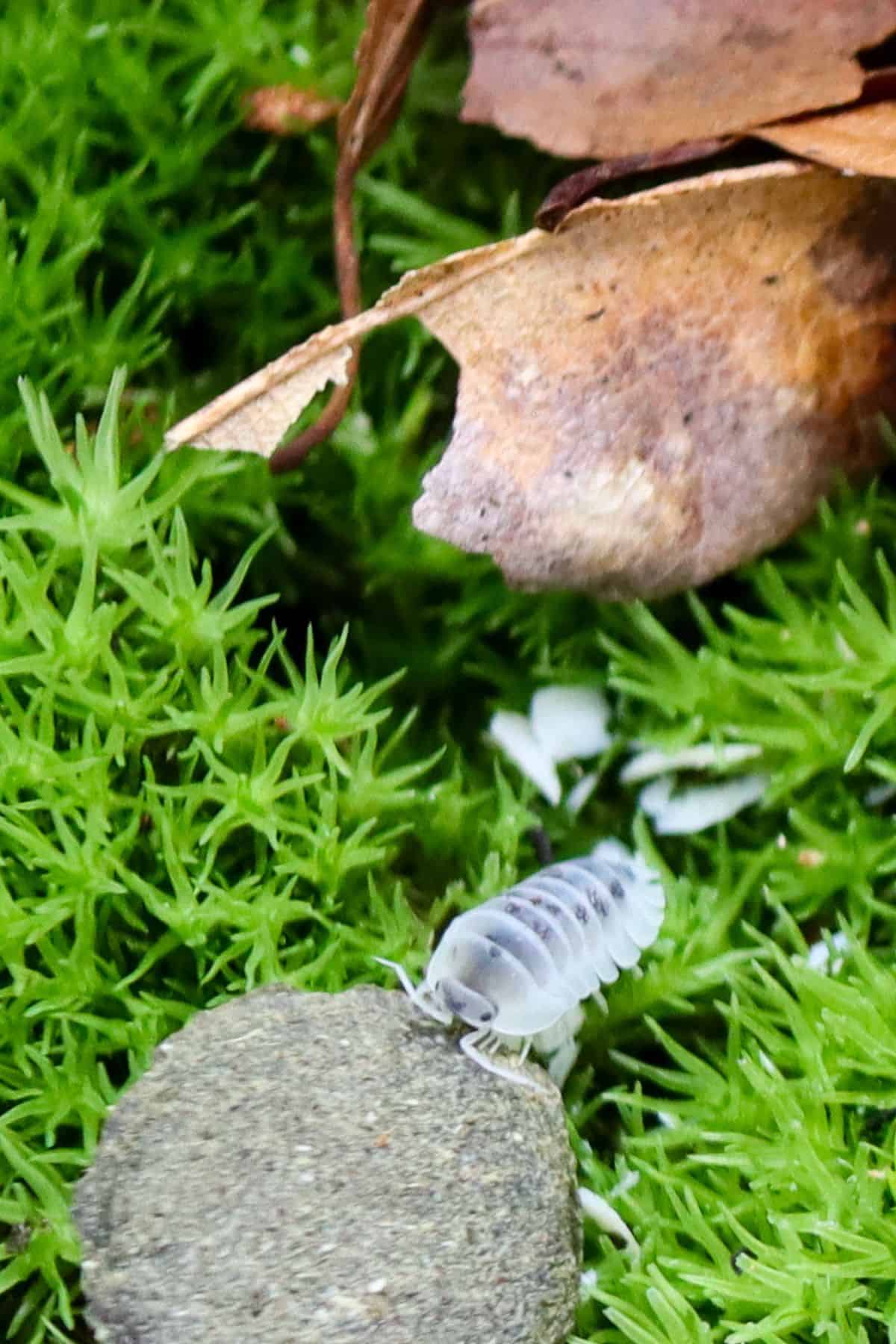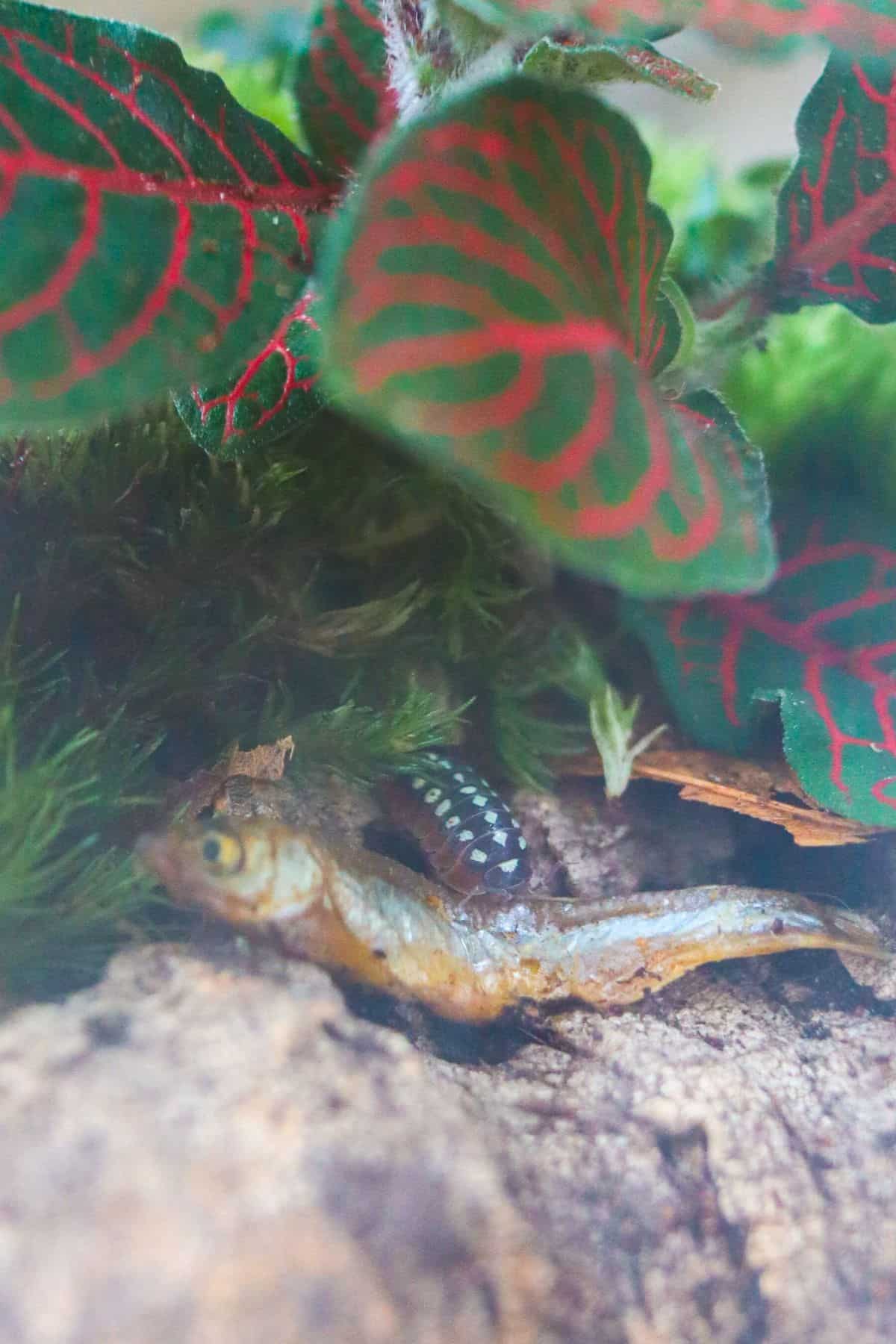Isopod food is as varied as it is weird.
As Nature’s great recyclers, it’s their job to consume any and all plant/animal waste.
Fallen leaves, rotting wood, leftover sandwich crusts – anything is fair game.
If not for their diverse (and peculiar) appetite for decaying organic matter, the nutrient cycle would break down and our wonderful plant world wouldn’t grow.
Thankfully, isopods perform the same function in a bioactive terrarium ecosystem. Which is what makes them such a great cleanup crew.
So, how do we best keep them fed and healthy – either in an isolated culture or vivarium ecosystem – and what supplemental foods do they like?
Let’s find out.

Terrarium Tribe is reader-supported. When you purchase through links on our site, we may earn an affiliate commission (at no further cost to you). 💜
What Are the Best Isopod Foods?
Generally speaking, the best isopod food doesn’t vary too much from species to species.
Of course, they’ll all have their slight preferences and differences in appetite, but a one-size-fits-all approach does work by and large.
The Staple Diet
In an isopod culture, the backbone of any diet should be as close to nature as possible. Making leaf litter and decaying wood your primary options.
Conveniently for us, these are typically what we’d use as substrate and hardscape in a terrarium anyway.
I love it when a plan comes together!
Most types of leaf litter will work, but it’s worth noting that softer leaves will more readily decompose, which is best!
It’s worth sterilizing any that you collect yourself (30 mins at 200°F is the usual recommendation), or you can buy it in ready to go.
👉 We sell organic pin oak leaf litter on our store.

Though technically a bark, cork bark is a popular choice for isopod cultures for various reasons. Mostly because isopods love to hide underneath, but they will snack on it to some extent too. It’s just not a good primary food source because it breaks down so slowly.
On the wood front, you’re looking for softwoods – cholla wood is a good option that we’ve had success with.
Finally, most bioactive substrates are going to contain some form of organic compost. It’s designed mostly for plants, but you bet your isopods are going to love it too. See my guide to substrate for isopods for a deep dive into this.
In our terrarium substrate mix we use earthworm castings. It’s literally the waste of worms. You can’t get closer to nature than that…
Plant-based Isopod Food Recipes
Just like us, isopods do better with a balanced diet.
Not only do they simply enjoy a variety of foods (variety is the spice of life, after all) but it also tends to lead to faster breeding and healthier populations.
So, it really is worth supplementing their diets where possible.
In the wild, isopods would naturally consume any vegetables or fruit that they encounter on the ground. Anything goes, right? That means they’ll readily eat just about any that we eat, too.
I’ve heard keepers using, carrots, sweet potato, watermelon, zucchini, cucumber, apple… The list goes on.

You’ve probably already washed or peeled anything from the chopping board, but it’s worth doing to get rid of any potential pesticides.
Personally, I’d avoid fruit too. The high moisture and sugar content tends to lead to mold and sometimes unwanted pests (e.g., fruit flies or fungus gnats).
For the same reason, you’ll want to provide supplementary food little and often. Any uneaten food is just a potential problem.

Dedicated isopod food in the form of proprietary blends is arguably the most convenient option (but more on that later).
Protein for Isopods – Needs and Sources
As part of their natural diets, isopods will also be devouring animal carcasses.
It’s probably more likely beetles and insects than buffalo, but you get the idea.
So, naturally, we need to be able to provide the same in a cultured environment. It wouldn’t make up the bulk of their diet in nature – so we don’t need to provide protein in every meal – but it helps to have a somewhat consistent source.
Good protein source options:
- Fish food – Dried fish flakes or pellets are super easy to source and store, so it’s worth having some on hand. Add a few at a time and watch them go nuts. You’ll want a premium blend with natural protein sources rather than generic stuff full of filler. This brand on Etsy has a wide range of “gourmet blends.”

- Dried shrimp and fish – Whole animal sources like this provide a huge chunk of protein and a wide variety of minerals. Plus, dried foods have the advantage of holding up better against mold in humid enclosures. The shop above sells various packs of dried fish, like this freeze-dried red shrimp.

- Yeast – Brewers yeast is another convenient food you can easily stock up on. It’s full of protein and contains lots of vitamins and minerals. Though it is a live yeast, so it’s a bit of a risk from an overgrowth point of view.
- Vivarium animal waste – In a bioactive vivarium, the waste of any pet (e.g., snakes, lizards, or frogs) makes an effective, free, and renewable food source. Just note, a large pet will need a lot of isopods to effectively manage it… and they may get eaten themselves.
With protein, a little bit every week or so should do it. Only enough that they can completely consume in one sitting, as meat and the like will quickly spoil… and stink.
How to Give Isopods Calcium
Isopods might not have pearly white teeth (or backbones, for that matter), but they do have an exoskeleton that needs some support from calcium.
This is one requirement that does seem to differ a fair bit between species.
With soft-shelled varieties like Porcellionides pruinosus not needing as much as the larger hard-shelled varieties like the Dairy Cow Isopods.
Regardless, calcium supplementation is still one of the more minor concerns, and it’s easily addressed.
The easiest and most readily available calcium source is going to be egg shells.
Crush em up, and add a little pile to the enclosure every now and again. They might not seem appetizing, but you’d be surprised!
Alternatively, people also use cuttlebone (not actually a bone, but the internal shell of a cuttlefish – who knew?), which can be bought from most pet stores. Birds like it I think?
Finally, shrimp and other crustaceans are a reasonable source of calcium, too. So you might find that’s enough if you’re using shrimp as a regular protein source (shell on, ideally).
Isopod Food for Sale
When it comes to dedicated isopod food, there are a variety of proprietary blends out there.
Each has its own unique formulation, but if you stick with one from the experts then you know it’s been tried and tested with a variety of species. That’s why I recommend the one developed by expert breeders, Rubber Ducky Isopods.
It’s a complete veggie, protein, and calcium nutritional supplement.
👉 You can grab their Superfood powder directly on our shop.
Over to You
What’s your favorite isopod food?
Do you have your own unique isopod food recipe?
Share it with us in the comments!
Next, why not check out our complete guide: What Are Isopods?

These were really helpful and my pet giant isopod is living peacefully without lacking any nutrition.
This really helped with my isopods. Thanks!
Thanks for the article. Very informative and helpful!
I like to give them molts from my other insects! They love mantis and dubia roach molts
I have white granulated isopods. They like lichen that I get off trees. They also love the wilted flowers of my viola and pansy plants. They also like dry fish food flakes.
I will try algae wafers next, as your article recommend them.
so far I’ve been using a mix of flour, eggshell, oats, yeast, and a sprinkling of fish food in my dry mix for the springtails. i think the isopods enjoy it too considering there’s SO many babies in there atm.